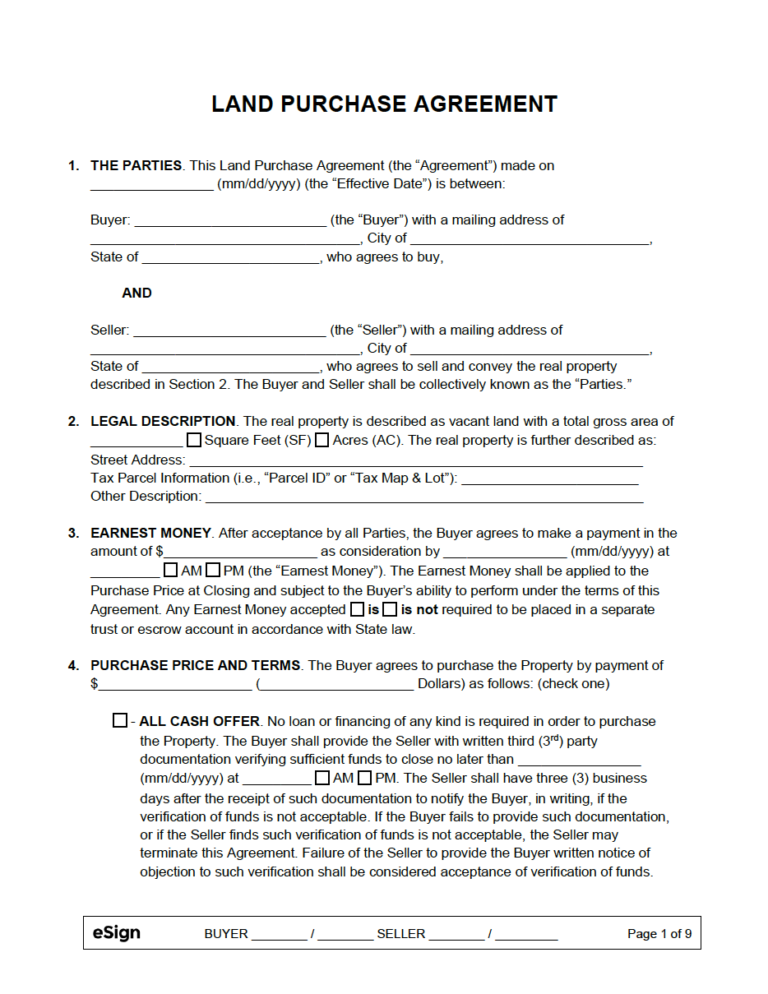
What is a Land Purchase Agreement?
A land purchase agreement, also known as a land contract or a purchase agreement, is a legally binding contract between a buyer and a seller for the purchase of a piece of land. This agreement outlines the terms and conditions of the sale, including the purchase price, payment terms, and any contingencies or conditions that must be met before the sale is finalized.
Land purchase agreements are commonly used when buying vacant land, undeveloped land, or rural properties. They provide a clear and structured framework for the transaction, protecting the rights and interests of both the buyer and the seller.
Why Do You Need a Land Purchase Agreement?
A land purchase agreement is essential for both buyers and sellers to ensure a smooth and legally sound transaction. Here are some reasons why you need a land purchase agreement:
- Protection: A land purchase agreement protects the interests of both parties by clearly defining the terms and conditions of the sale.
- Legal Compliance: The agreement ensures that the transaction complies with all applicable laws and regulations.
- Clarity: It provides clarity on important details such as the purchase price, payment terms, and any contingencies or conditions.
- Enforceability: A well-drafted land purchase agreement is legally enforceable, allowing either party to seek legal remedies in case of a breach.
What Should a Land Purchase Agreement Include?
A comprehensive land purchase agreement should include the following key elements:
- Buyer and Seller Information: The full names, addresses, and contact information of both the buyer and the seller.
- Property Description: A detailed description of the property being sold, including its address, boundaries, and any relevant legal descriptions.
- Purchase Price: The agreed-upon purchase price for the land, along with any specific terms for payment.
- Payment Terms: The payment schedule, including the amount of the down payment, interest rate (if applicable), and the duration of the payment period.
- Contingencies: Any contingencies or conditions that must be met before the sale is finalized, such as obtaining financing or conducting inspections.
- Closing Date: The date on which the sale is expected to be completed and the title of the property is transferred to the buyer.
- Default and Remedies: The actions that can be taken by either party in case of a breach or default of the agreement.
- Signatures: The agreement should be signed and dated by both the buyer and the seller, as well as any witnesses or notaries required by local laws.




How to Create a Land Purchase Agreement?
Creating a land purchase agreement involves the following steps:
1. Gather Information
Collect all the necessary information, including the buyer and seller details, property description, purchase price, payment terms, and any contingencies or conditions.
2. Use a Template or Draft from Scratch
You can use a template or draft the agreement from scratch. Templates are readily available online and can provide a starting point for creating a customized agreement.
3. Customize the Agreement
Edit the template or draft to include the specific details of your transaction. Make sure all the relevant information is accurately reflected in the agreement.
4. Review and Revise
Review the agreement carefully to ensure that it accurately reflects the intentions of both parties. Make any necessary revisions or amendments before finalizing the document.
5. Seek Legal Advice
It is always a good idea to have a lawyer review the land purchase agreement to ensure its legality and completeness. They can provide guidance and make any necessary adjustments.
6. Sign and Execute the Agreement
Once both parties are satisfied with the agreement, sign and date the document. It is recommended to have witnesses or notaries present if required by local laws.
Sample Land Purchase Agreement
Here is a sample land purchase agreement to give you an idea of how the document could be structured:
[Include a sample land purchase agreement here]
Tips for a Successful Land Purchase Agreement
- Do Your Due Diligence: Conduct thorough research and inspections to ensure the land meets your needs and expectations.
- Get Financing in Place: Secure financing or ensure you have the necessary funds to complete the purchase.
- Include Contingencies: Protect yourself by including contingencies for financing, inspections, or any other important factors.
- Work with Professionals: Seek advice from real estate agents, lawyers, or other professionals to ensure a smooth transaction.
- Read and Understand the Agreement: Take the time to carefully review and understand all the terms and conditions of the land purchase agreement.
- Negotiate if Necessary: If there are areas of concern or disagreement, negotiate with the seller to find a mutually beneficial solution.
- Keep Communication Open: Maintain open lines of communication with the seller to address any questions or concerns that may arise during the process.
- Follow Local Laws and Regulations: Ensure that the land purchase agreement complies with all applicable laws and regulations in your jurisdiction.
Final Thoughts
A land purchase agreement is a crucial document for buying or selling land. It provides a legally binding framework for the transaction, ensuring the rights and interests of both parties are protected. By understanding the key elements and following the necessary steps, you can create a comprehensive and enforceable land purchase agreement that facilitates a successful land transaction.
Land Purchase Agreement Template Word – Download